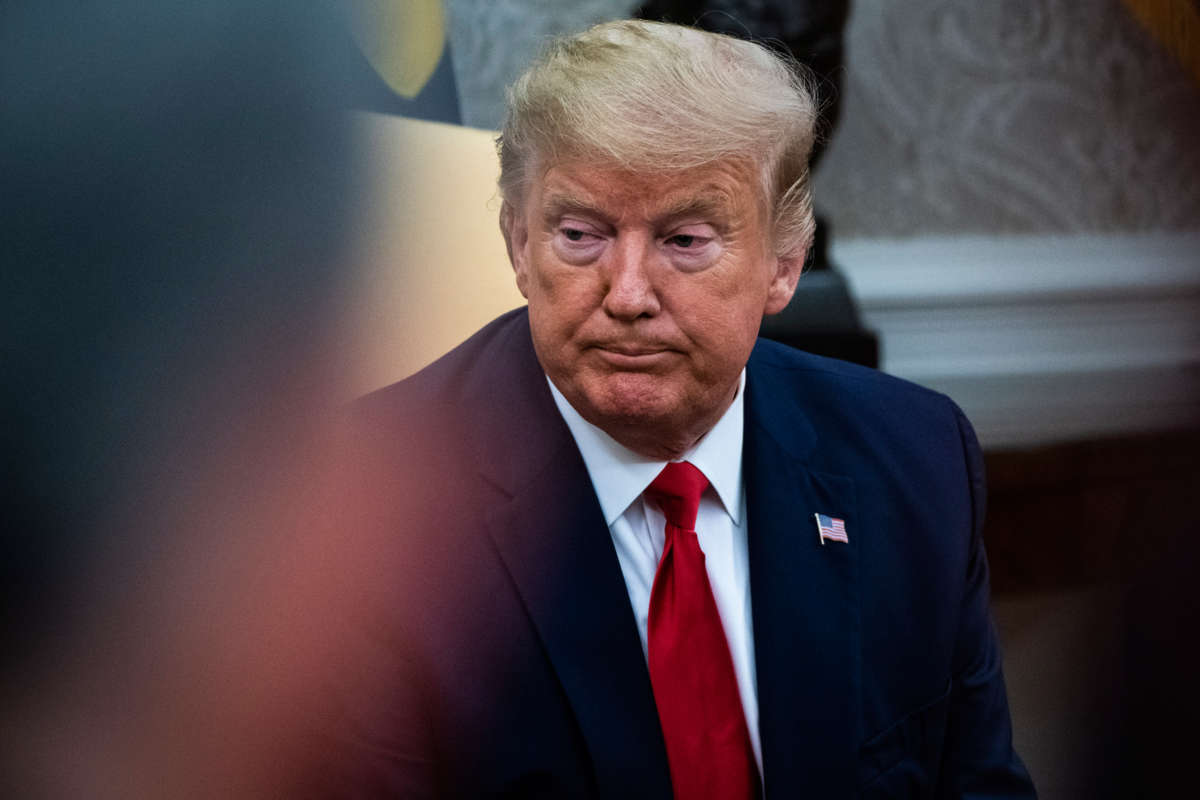The U.S. assassination of Iranian General Qassim Suleimani opened a pandora’s box in the Middle East. Iran’s initial response has come in the form of a direct missile attack on the Ain al-Assad U.S. military base in Iraq. While this morning President Trump ruled out an immediate military escalation given that there were no U.S. casualties, he did announce that there would be heightened sanctions on the country. Trump’s approach to Iran ensures direct conflict unless he leans off his so-called “maximum pressure” policy, which has always included punishing sanctions that harm the Iranian people.
The Iranian military strike on U.S. positions in Iraq is unprecedented in the modern era, marking the first time a U.S. military base has come under direct attack by a foreign power in decades.
Iranian officials have made clear that they do not want a war. The missile attack was a carefully calibrated and deliberate strike designed to be symbolically significant but to avert the risk of war by not killing Americans. The attack is Iran’s overt and public response to the assassination, aimed at assuaging domestic opinion. However, it may be followed by a covert element potentially marked by assassinations, bombings, and/or attacks by Iranian allies in the region and beyond.
The Suleimani assassination was undoubtedly an act of war. The U.S. has effectively legitimized the use of targeted assassination against senior statesmen, with Suleimani being the equivalent of the U.S. National Security Adviser or the commander of CENTCOM. The context for the assassination is also vitally important: It occurred amid a full-scale U.S. economic war on Iran.
President Trump’s reckless and needless decision in May 2018 to renege on the Iran nuclear deal, formally known as the Joint Comprehensive Plan of Action (JCPOA), set the U.S. and Iran on a collision course. Trump opted to initiate a “maximum pressure” campaign against Iran marked by severe economic sanctions and efforts to incite unrest inside Iran. This has included an aim to reduce Iranian oil exports — the lifeblood of the Iranian economy — to zero, sanctions on the Iranian Central Bank and Sovereign Wealth Fund, and cutting Iran off from all international banking and trade.
The impact of the “maximum pressure” campaign inside Iran has been equivalent to a medieval siege. Human Rights Watch has documented shortages of life-saving medicine. The economy has entered a deep recession, inflation has skyrocketed, and many staple goods are increasingly unaffordable for large portions of the population. All the while, “maximum pressure” has not been attached to any diplomatic goal grounded in feasible compromise.
The Trump White House’s destructive Iran policy has been driven by pro-war hardliners such as Secretary of State Mike Pompeo, who pushed hardest for Suleimani’s assassination, and for nearly two years by the rabid hawk and former National Security Adviser John Bolton. The options presented to Iran were twofold: either total capitulation on its national security interests in the form of 12 maximalist demands laid out by Pompeo, or the collapse of the country under the weight of U.S. pressure. These fantastical aims were always untenable and set the stage for Iran to counter-escalate.
Direct U.S.-Iran conflict is inevitable so long as maximum pressure continues to be the U.S. policy. Iran will continue to search for ways to raise the costs for maximum pressure, and in the past year has gradually reduced compliance with the JCPOA and been blamed for attacks on oil tankers in the Emirati port of Fujairah and Saudi oil facilities. Furthermore, the assassination of Suleimani severely reduces potential for direct U.S.-Iran diplomacy, as no Iranian leader could now negotiate with the murderer of the revered general.
What small hope still exists for diplomacy is by way of multilateral talks that include the other powers that negotiated the JCPOA, namely Russia, China, the United Kingdom, France and Germany. Iran has stated, including after Suleimani’s assassination, that it would return to full compliance with the nuclear deal if the other parties to the agreement live up to their commitments under the deal with respect to sanctions relief. If Trump wants to avert a disastrous regional conflict, he must ease economic sanctions and seek to diplomatically engage Iran in concert with traditional U.S. allies and other world powers.
The fact is that the maximum pressure policy drastically intensified the risk of a major regional war. Before maximum pressure, there were no attacks attributed to Iran in the Persian Gulf or Iraq. The JCPOA was the first time the U.S. and Iran resolved a dispute between them through diplomacy. It set the stage for further negotiations and perhaps a normalization of the troubled U.S.-Iran relationship after four decades of hostilities. Donald Trump undid all of that and has taken the two countries to the precipice of war. If such a conflict does occur, the biggest losers would be the people of the region.
Media that fights fascism
Truthout is funded almost entirely by readers — that’s why we can speak truth to power and cut against the mainstream narrative. But independent journalists at Truthout face mounting political repression under Trump.
We rely on your support to survive McCarthyist censorship. Please make a tax-deductible one-time or monthly donation.
